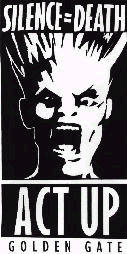 |

|
|
|
| By John S. James
AIDS Treatment News
This is changing; for example, the new national organization ATAC (AIDS Treatment Activist Coalition) is intensely interested in training and mentoring new activists. For more information, see: http://www.atac-usa.org Often treatment activists are so involved in the issues that there is little thought to maintenance of the organization -- for example, little outreach to explain to the community what they are doing and why, and to let people know what assistance they need.
 Several years ago ACT UP Golden Gate (now Survive AIDS) solved several of
these problems by getting a weekly column on AIDS treatment
in the Bay Area Reporter, a San Francisco gay newspaper.
The columns were written by a "writers pool" of five or six
members, and most had an action-alert box in addition. It
took considerable work from a coordinator to make sure that
a volunteer finished an article every week.
Several years ago ACT UP Golden Gate (now Survive AIDS) solved several of
these problems by getting a weekly column on AIDS treatment
in the Bay Area Reporter, a San Francisco gay newspaper.
The columns were written by a "writers pool" of five or six
members, and most had an action-alert box in addition. It
took considerable work from a coordinator to make sure that
a volunteer finished an article every week.
ACT UP Philadelphia successfully reaches across race and class barriers, and as a result is probably the largest ACT UP chapter in the world. It can get hundreds of people to demonstrations even outside the city, in Washington or New York. Project TEACH, an excellent education program of Philadelphia FIGHT, has trained hundreds of peer educators in treatment and activism. A widespread problem retaining people is that AIDS activists have traditionally been too harsh with each other, apparently more so than in most social movements. Most of the disputes have been due to personality differences, accidents, misunderstandings, or escalating "flame wars" where each tries to outdo the other with insults -- rather than substantive disagreements. People needed to give each other more slack, and that is happening now. Everyone knows there is more than enough work to go around, and that nobody can be sure they are right. If we may mention our own work in conflict prevention, we have developed a kind of education designed to take place in the interaction rituals of everyday life -- not in special classes or settings. The idea is to design "practices" (self-training exercises completely integrated with whatever we are doing anyway) for using routine errands and other throwaway moments to build skills for better communication, personal interaction, and relationship development. For more information, see: http://www.communicationpractices.org Improving Fundraising
And much effort and expense goes into events like walks, rides, and other emotional experiences for donors -- an activity requiring very different skills from effective service delivery. Only large organizations can afford professional development departments -- and only a few can be largely successful year after year at two entirely different missions simultaneously (with the fundraising mission directly determining organizational survival, while the official mission does not). It is said that one can't dance at two weddings with one tush. But that is what we expect almost every service organization to do. No wonder so many groups need technical help with fundraising. Besides more technical help, we would like to see more focus on educating and involving donors in what is actually going on (in addition to seeking money through name recognition, or by producing donor events and experiences having little to do with the service or advocacy mission). We reluctantly believe that all these approaches are inevitable. Modern society has thousands of different worlds, and most people live in only a few of them. Those who do not need services are unlikely to understand them. Those who do are unlikely to have much money to donate. This disconnect makes it hard to raise money, and to deliver services well. But until there is a deeper commitment to making the world work, it may be the best we can do. AIDS Treatment News Published twice monthly Subscription and Editorial Office: 1233 Locust St., 5th floor Philadelphia, PA 19107 800/TREAT-1-2 toll-free email: aidsnews@critpath.org useful links: http://www.aidsnews.org/ Editor and Publisher: John S. James Associate Editor: Tadd T. Tobias Statement of Purpose: AIDS Treatment News reports on experimental and standard treatments, especially those available now. We interview physicians, scientists, other health professionals, and persons with AIDS or HIV; we also collect information from meetings and conferences, medical journals, and computer databases. Long-term survivors have usually tried many different treatments, and found combinations that work for them. AIDS Treatment News does not recommend particular therapies, but seeks to increase the options available. AIDS Treatment News is published 24 times per year, on the first and third Friday of every month, and print copies are sent by first class mail. Email is available (see below). Back issues are available at http://www.aidsnews.org/ To subscribe, you can call 800-TREAT-1-2 or 415-255-0588: |

© 1997-2002 BEI
 AIDS activist from ACT UP Philadelphia on the march
AIDS activist from ACT UP Philadelphia on the march